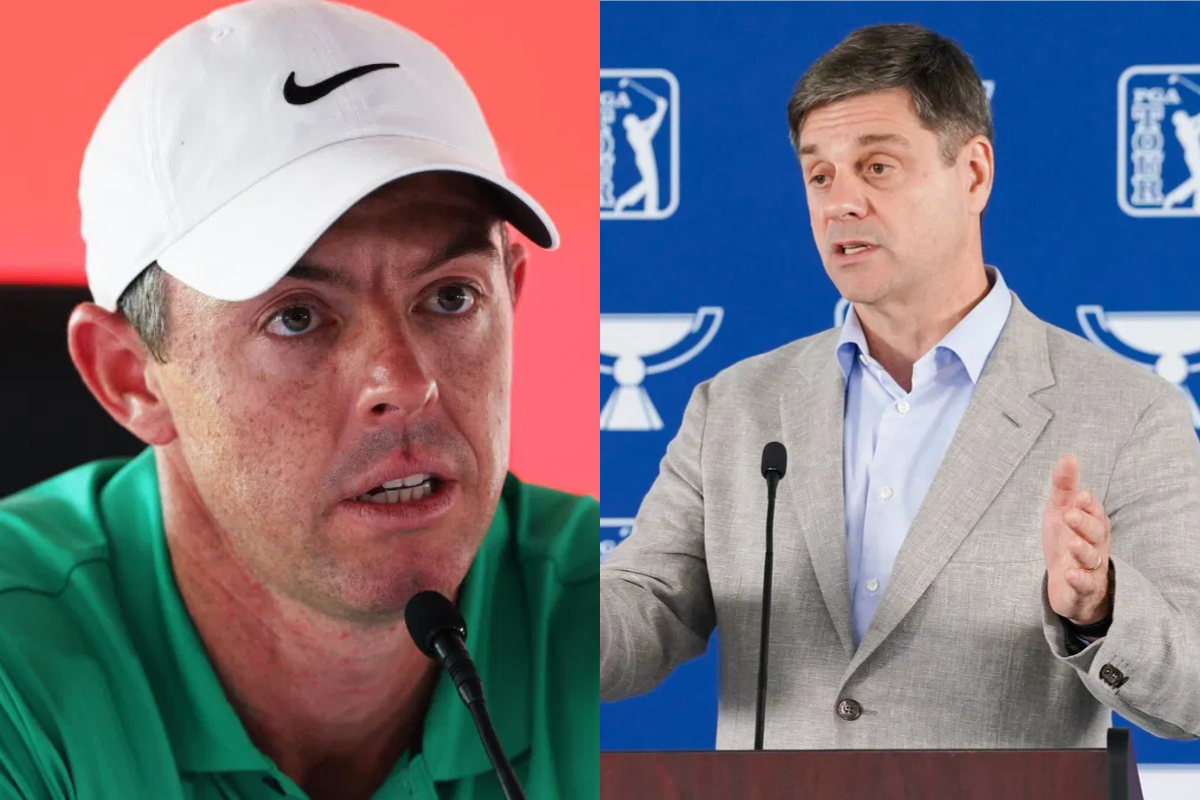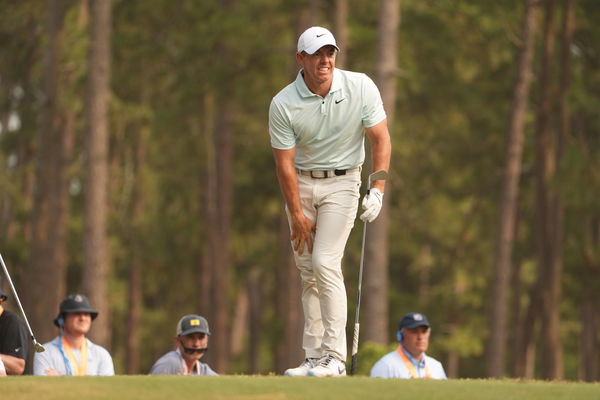



“I want to play golf where I want to play golf. I want to play in the locations that I love to go to,” said Rory McIlroy. With that, he once again reminded the golf world of his willingness to chart his own path. Skipping three signature events and even a FedExCup playoff this year was more than a scheduling choice—it was a statement. His words land like a warning shot: global growth over PGA Tour rules?
Watch What’s Trending Now!
Rory McIlroy’s latest remarks highlight the cracks in the PGA Tour’s traditional structure. Rejecting minimum event requirements, he prioritizes flexibility, enjoyment, and selectivity, signaling that change is inevitable. Analysts framed his words as a generational warning, drawing parallels to Roger Federer’s late-career freedom to explore new tournaments. Inspired by that model, McIlroy now seeks fresh locations, even at the expense of lucrative U.S. stops. Analysts mentioned on Golf Channel, “If you’re Brian and the ceo of the PGA Tour, that’s a warning shot right there in my mind, because it seems as though there’s a potential that this generation of players would go towards being freelancers, that they play where they want, when they want.” Analysts warned that McIlroy’s stance hints at a “freelancer” era, where players act as independent contractors—choosing when and where to play rather than following tour obligations.
He further stated, “And Rory was very pointed to say that he will do what it requires to maintain membership of the various tours, but eventually, the schedule required to do that is going to start to go the wrong way. In the united states, it’s 15 events minimum. That’s his way of telling the pga tour that the protectionism that has been in place for a long time, that the pga tour itself ought to take a broader view of the game right now. Because he’s going to play in india later this year for the first time. And those are events that are deeply worthy events. He’s been an advocate for this idea that there ought to be a more unified tour in this game. The PGA Tour has never gone down that road. It’s always been fairly domestic.” Rory juggles multiple memberships and even jokes about paying for 18 clubs, so loyalty isn’t the issue. Instead, he emphasizes how expectations can overshadow experience. He will play in India for the first time at the DP World India Championship, October 16–19 at Delhi Golf Club. The $4 million event aligns with his vision of a more unified, global tour. Like Djokovic and Messi—athletes who became global icons by stepping outside domestic structures—Rory signals that golf’s future lies in embracing the world stage. His debut in India demonstrates that he values cultural exposure and fan connection, not just financial gain.

Imago
US Open Rory McIlroy NIR on the 15th tee during the final round of the 124th US Open Championship, Pinehurst No2, Pinehurst, North Carolina, USA 16/6/2024. Picture Fran Caffrey / Golffile.ie All photo usage must carry mandatory copyright credit Golffile Fran Caffrey Pinehurst Pinehurst No2 USA Copyright: xFranxCaffreyx
Analysts questioned whether Rory McIlroy’s global pivot would attract corporate backing. One asked pointedly, “Is there corporate support for it?” The response was cautious: “We’ll find out in time and whether or not there’s traction to build that business out.” The discussion naturally circled back to Roger Federer.
While Federer explored global events, he remained under one umbrella. McIlroy’s path is different. As one analyst put it, “If you’re the PGA Tour, it becomes another reason why you need a presence elsewhere in the world. When Federer decided to play other events, he was still under one tour. Rory is saying he’ll play in more events that aren’t currently aligned with the PGA Tour. Whether they are in the future is an open question.” This is the central tension.
Federer branched out but never left the tour structure, whereas McIlroy signals independence by stepping into tournaments outside the PGA’s orbit. In golf, aligned events count toward rankings and memberships, while non-aligned ones offer prestige and prize money without FedExCup points. McIlroy seems less concerned with points and more with value, location, and meaning. His recent commitment in India underscores this, broadening golf’s global map even without direct ranking benefits.
Analysts argue that this shift is more than personal choice. By prioritizing global relevance over traditional alignment, McIlroy sets the tone for others to follow. For years, he has championed the idea of a unified world tour, moving beyond domestic borders. These decisions are no longer just rhetoric—they are active tests of the model, and they may force the PGA Tour itself to think globally.
Why Golf’s Old Guard Is Feeling the Cracks
For decades, professional golf thrived on tradition, loyalty, and centralized control. Today, those foundations are visibly cracking—rival leagues like LIV Golf challenge old structures with franchise models and guaranteed paychecks. Meanwhile, merger talks push the PGA Tour into uncharted territory. Add mounting antitrust scrutiny and shifting player priorities, and golf’s once-stable guard looks less invincible than ever. Beyond Rory McIlroy, golfers are embracing international tournaments to expand their careers.
Bryson DeChambeau will compete in the inaugural International Series India at DLF Golf Club in Gurugram. This event boosts the Asian Tour and offers players new opportunities in emerging markets. Similarly, LIV Golf stars like Joaquin Niemann and Abraham Ancer join, reflecting a growing trend to play beyond traditional circuits.
This shift toward global play shows golfers changing priorities. New markets, diverse cultures, and global recognition increasingly appeal to professionals. As more players schedule events in Asia, the Middle East, and other regions, traditional tour structures face disruption. The trend points to a future where golfers gain autonomy and break free from established tour conventions.


